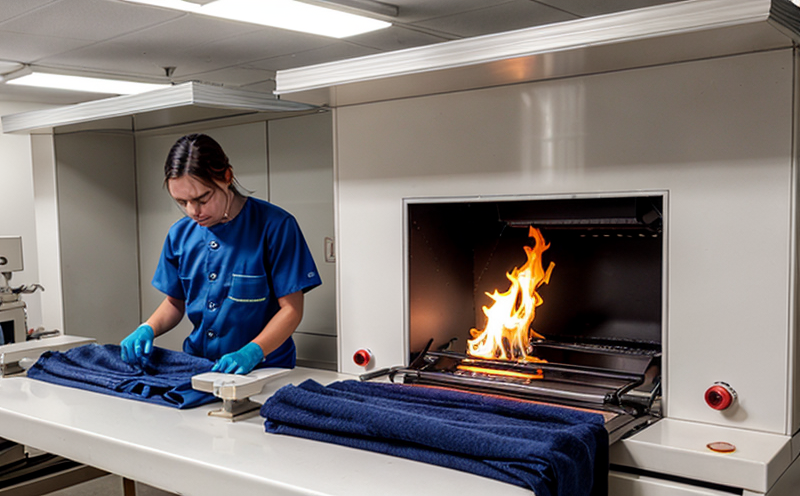Textile & Apparel Flammability Testing
In today’s world, ensuring the safety and well-being of consumers is a paramount concern. Among various industries, textiles and apparel play an essential role in our daily lives. The flammability properties of materials used in clothing and other textile products can significantly impact fire safety outcomes. Therefore, conducting thorough flammability testing becomes indispensable to safeguard users against potential hazards.
The global demand for fire-safe clothing has grown exponentially with increasing awareness about the risks associated with poorly designed or manufactured textiles that could ignite easily under certain conditions. This has led many countries and organizations around the world to adopt stringent regulations regarding textile flammability standards such as those specified by ISO 16722, which provides guidelines for determining whether textiles meet acceptable fire safety requirements.
Our laboratory specializes in providing comprehensive flammability testing services tailored specifically towards textile and apparel products. Our team utilizes advanced equipment like thermogravimetric analyzers (TGA), cone calorimeters, oxygen index testers, among others to perform precise measurements that give us reliable data points about the combustion behavior of different fabrics.
Flammability tests are conducted on various types of clothing materials including cottons, synthetics, blends, leathers, and more. These assessments help manufacturers ensure their products comply with local laws like those enforced by European Union directives (EU) or American National Standards Institute standards (ANSI). Compliance ensures not only safety but also protects brands from legal repercussions due to non-compliance.
Our testing process begins by selecting appropriate samples representative of the intended product line. Following this, we apply standardized methods such as those outlined in ISO 13565-2 for horizontal burning tests on small specimens or ASTM D6473 for large garments. Throughout these procedures, strict adherence to protocol helps maintain accuracy and consistency.
Post-testing analysis involves interpreting results based on predefined criteria set forth by applicable standards. Our experts then compile comprehensive reports detailing findings along with recommendations for improvement if necessary. These insights empower clients to make informed decisions about their product development processes leading ultimately towards safer, compliant textile offerings.
Eurolab Advantages
- State-of-the-art facilities: We have cutting-edge laboratories equipped with the latest technology to conduct rigorous flammability tests according to international standards. This ensures accurate and reliable results.
- Certified professionals: Our team comprises highly qualified experts who possess extensive experience in textile science and fire safety. They stay updated with the latest industry trends ensuring that we offer services aligned closely with current best practices.
- Comprehensive coverage: We cover a wide range of fabric types, sizes, and styles making us versatile enough to cater to diverse client needs across different sectors including fashion, sportswear, and industrial wear.
- Fast turnaround times: Clients can expect quick results without compromising on quality. This allows businesses to stay agile and responsive in meeting tight deadlines associated with new product launches or compliance audits.
- Cost-effective solutions: By offering competitive rates coupled with excellent value-added services, we ensure that our clients receive cost-efficient solutions while still achieving the highest levels of safety and quality assurance.
Customer Impact and Satisfaction
Implementing rigorous flammability testing is crucial for ensuring product safety, which directly impacts customer satisfaction. By adhering to strict international standards like ISO 13565-2 or ASTM D6473 during our tests, we provide clients with peace of mind knowing that their products meet the highest level of fire safety requirements.
- Enhanced brand reputation: Compliance with relevant regulations enhances customer trust and loyalty. Brands associated with high-quality, safe clothing often enjoy better reputations.
- Improved product performance: Through our detailed analyses, manufacturers can identify areas for improvement in their designs or manufacturing processes, resulting in enhanced product quality.
Environmental and Sustainability Contributions
Incorporating sustainable practices into textile production is becoming increasingly important. Ensuring that textiles are flame retardant according to recognized standards not only promotes safety but also supports environmental goals by reducing the need for post-production treatments like chemical fire retardants.
- Reduced waste: By identifying and rectifying issues early in the design stage, less fabric goes to landfills due to non-compliance or subpar performance.
- Eco-friendly manufacturing processes: Our tests encourage manufacturers to adopt greener practices throughout their supply chains, thereby minimizing environmental impact.





